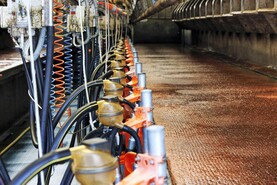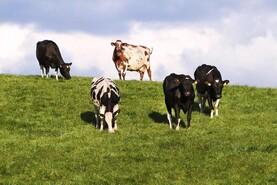The formation of Ireland’s first dairy farmer producer group has garnered a lot of headlines, understandably so.
The Munster Dairy Producer Organisation may well change the supplier-processor relationship, particularly for its members in Kerry, Limerick and Clare, and Kerry Group, who they all supply. However, up at the other end of the island, changes are happening that may shake up the market more.
Last month, the Fair Dealing Obligations (Milk) Regulations 2024 came into effect in Northern Ireland (NI), and indeed across the UK.
One part of that legislation precludes dairy processors from penalising suppliers for switching their supply, provided they have served out the correct notice period. Up until now, farmers leaving could be subjected to penalties of various forms.
This change comes into a pretty competitive landscape, with processors as keen for more milk in Northern Ireland as they are in the Republic of Ireland.
Only last month, about 11m litres left Lakeland, going mostly to Tirlán and Strathroy. These farmers had served out their 12-month notice period, and left. In April, Lakeland lost about six million litres, half of which went to Dale Farm. That’s over two-thirds of 1% of Northern Ireland’s 2.5bn litre milk pool on the move in only three months.
Milk output has only increased by about 300m litres in Northern Ireland over the last decade, a 13% rise. Quotas were never as much a restraint in Northern Ireland. In fact, the big period of dairy expansion was 2008-2014, when output increased by 24% from 1.77bn litres to 2.2bn litres. And there are currently fears that milk supply will come under further pressure due to environmental concerns and constraints on both sides of the border.
Looser bonds
With the exception of Dale Farm and to a lesser extent, Tirlán, most NI dairy farmers do not hold shareholding in the processors they supply. This means the bonds that tie suppliers to their co-ops are looser.
A gap has recently emerged between milk prices in Northern Ireland and those in the Republic.
Tirlán is paying an all-in base price of 37.15p/l in Northern Ireland (to include a sustainability bonus) which, allowing for exchange rates and adjusting for butterfat and protein base, equates to around 42.7c/l. That compares favourably to a base price of 40.55c/l being paid by Tirlán in the Republic of Ireland.
Some observers are saying that processors are in part competing on price to gain, regain and retain suppliers.
The co-op model has built stability and resilience into the Irish dairy sector, and should not be easily cast aside. But stories reach my ears of farmers finding it almost impossible to escape their processor, even having served notice to switch.
The Munster Dairy Producer Group will hardly be the only people examining the new legislation in Northern Ireland, and wondering if something similar would be in order in the Republic of Ireland.






 This is a subscriber-only article
This is a subscriber-only article










SHARING OPTIONS: